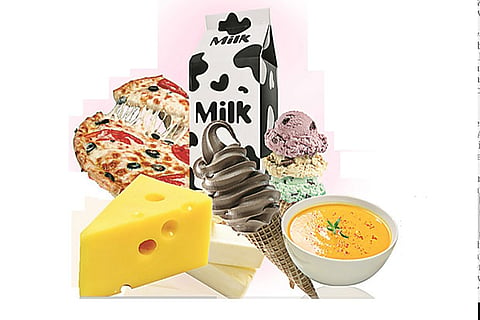

Chennai
A recent study, conducted by the Sanjay Gandhi Post Graduate Institute of Medical Sciences in Lucknow, found that three out of four Indians have lactose intolerance. The study that involved a vast section of the population from the north and south, concluded that the incidence was highest in the south at 82 per cent, and 66 per cent in the north.
Lactose intolerance is when the individual lacks the sufficient level of the enzyme, called lactase, that breaks down lactose or the sugar found in milk. This can cause discomfort, vomiting, flatulence and abdominal bloating.
Doctors say that while lactose intolerance is a well-known fact, this study has only established how common it is among Indians.
Genetically programmed
Dr P Basumani, Consultant Gastroenterologist, Fortis Malar Hospital, says that the reason for high levels of lactose intolerance among Indians is hidden in the story of human evolution. He says, “We became agriculturists and relied on grains and not much on milk, while Caucasians, owing to the weather, kept small animals for meat and milk. That is why the Westerners can have a huge bowl of cereals soaked in milk without showing any intolerance.”
However, milk has become a part of our diets, and more so, in the last century. “But even a litre or half a litre of milk can make us lactose intolerant,” he adds.
The answer also lies in our genetic programming, say doctors. We lose lactase after we reach one year of age, the time when we are weaned from mother’s milk. But, gut infections can also deprive even children of the enzyme. “Though children can have a few glasses of milk without displaying intolerance, sometimes, soon after an infection, that washes away the enzyme, they may show intolerance to lactose,” says Dr BS Ramakrishna, Director and Senior Consultant — Medical Gastroenterology, SIMS Hospital.
“However, in some, the symptoms can show even much later in life,” points out Dr M Barath Kumar, Consultant Gastroenterologist, Apollo Hospitals, OMR. The condition can only be treated by avoiding the food. “Lactase enzymes, available in the form of capsules, can be given, but they are not very effective,” Dr Sampathkumar Mani, Consultant Physician, Global Hospitals.
Differing incidence
Lactose intolerance differs in intensity of degree in India depending on the region, says Dr Ramakrishna. “People in Punjab and Haryana can continue to have milk even in adulthood,” he adds. Dr Basumani adds that while one person may show lactose malabsorption of half a litre with severe symptoms, another might express the same set of symptoms after consuming two litres.
He adds, “Even irritable bowel syndrome in some people can be linked to it, apart from bodily symptoms, like fatigue. In some cases of irritable bowel syndrome, physicians suggest that the person stop consuming milk to see if it makes a difference. But lactose is present everywhere — from tablets to cough syrups and even jams. At times, when we add it to rice — in the form of curd rice — there may be little reaction.”
Experts add that contrary to the common assumption that full fat milk can cause lactose intolerance, it is low fat milk that can result in the symptoms for many. “Full fat milk enters the intestine very slowly,” adds Dr Basumani.
KNOWING LACTOSE INTOLERANCE
Lactose intolerance is caused when one lacks the enzyme, called lactase, that breaks down lactose into glucose and galactose.
Some of the foods that contain lactose are milk, cheese, yogurt, butter and ice cream.
Symptoms may include abdominal bloating and cramps, flatulence, diarrhoea, nausea, rumbling stomach, or vomiting.
Visit news.dtnext.in to explore our interactive epaper!
Download the DT Next app for more exciting features!
Click here for iOS
Click here for Android